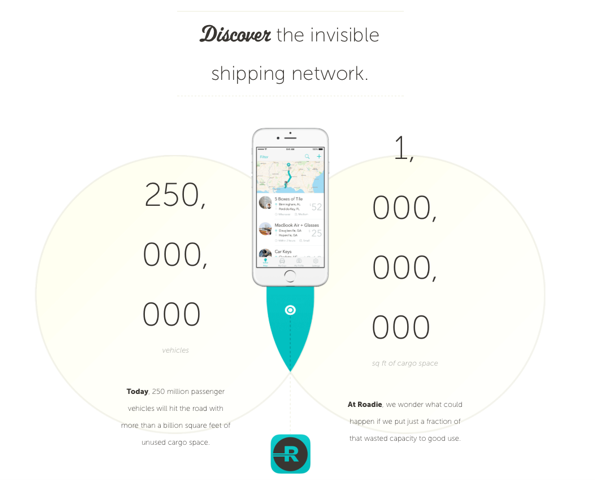When it comes to delivery, it’s the dotcom days all over again, with startup after startup aiming to disrupt the transportation industry with new technology (this time, mobile apps) and new business models (the sharing economy). The latest entrant is Roadie, which calls itself “the first neighbor-to-neighbor shipping network,” where a “gig” is a shipment or delivery and a “Roadie” is a driver. Here’s how the process works according to the company’s website:
Create a Gig: A Gig is what we call a shipment or delivery. Just create a Gig and we’ll match you with a Roadie driver who’s headed that direction. Think of it as carpooling for cargo. The Roadie mobile app makes it safe, easy and fun!
Choose a Roadie: Senders post Gigs with details and pictures of the stuff they want to send and Roadies choose the ones they like based on location, price, ratings and reviews. Double acceptance puts both sides in control.
Schedule a Time: No matter what you need to send, chances are there’s a Roadie who can deliver it same day, next day, on weekends or whenever. It’s a faster, cheaper, friendlier way to get your stuff where it’s going.
Track Your Stuff: Keep an eye on your precious cargo with near real-time tracking in the Roadie app. You’ll know where your stuff is, and you can connect with your driver along the way. Easy, right?
It’s the Uber model applied to delivery, which I wrote about recently in The Rebirth of Transportation Marketplaces, with a little Airbnb tossed in.

Roadie was launched last month, and according to an article in yesterday’s Wall Street Journal, the company has received over $10 million in funding from Square Inc.’s co-founder Jim McKelvey, TPG Capital founder David Bonderman, and UPS. What caught my attention was the news that Roadie has partnered with the restaurant chain Waffle House, where the restaurant’s 1,750 locations, which are open 24 hrs a day, will become “part of the network of pickup points for the [Roadie] service, offering a place for drivers to rendezvous with both senders and receivers.”
Or in transportation parlance, Waffle House restaurants will serve as cross-docking locations for Roadie.
As I’ve said before, many of these startups will join their dotcom predecessors in the graveyard, but I firmly believe that a small number will ultimately succeed in transforming the transportation industry. “Nobody really knows what technology will do and how this will all play out,” said Warren Stephens of Stephens Inc., who led the initial investment round in Roadie, in the WSJ article. “There has to be some piece of transportation that can be more effectively done with something like Roadie than the UPSes and FedExes and other traditional shippers.”
It’s the reason why UPS has put money in Roadie: “Startups provide opportunities to rapidly learn about a broader landscape of business models without distracting internal [research and development] resources…[investments in companies like Roadie can] improve the corporation’s ability to be proactive to technology advances and market shifts,” said Rimas Kapeskas, managing director of UPS’ Strategic Enterprise Fund, in the WSJ article.
What’s clear to me is that the traditional definitions of what is a delivery company, what is a warehouse, and what is a store are changing. And in the process, the makeup of distribution networks and how products flow from manufacturers to consumers are changing too. To echo Mr. Stephens, I don’t know how this will all play out down the road, and I doubt anyone does right now, but one thing is certain: traditional distribution networks and processes were built around yesterday’s consumer — who shopped almost exclusively at stores and malls, and who didn’t mind waiting 3-5 days for delivery — but new distribution networks and processes are needed for a new generation of consumers, who will shop more online and expect same-day shipping and delivery as a standard offering.
So, buckle up, because there will be some turbulence on this flight. And maybe a serving of waffles and eggs too.
For related commentary, see:









